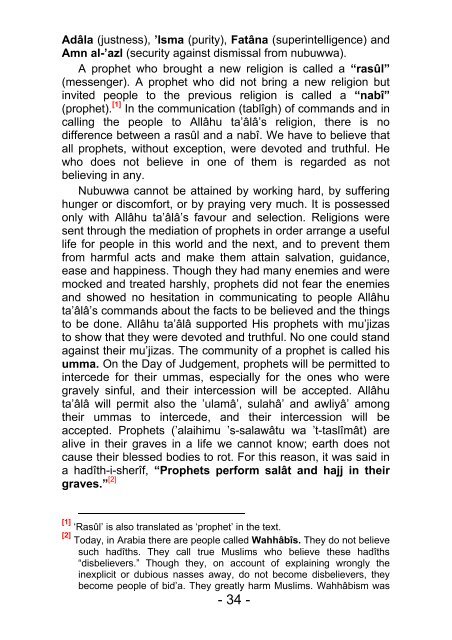8-Belief and Islam - Hakikat Kitabevi
8-Belief and Islam - Hakikat Kitabevi
8-Belief and Islam - Hakikat Kitabevi
Create successful ePaper yourself
Turn your PDF publications into a flip-book with our unique Google optimized e-Paper software.
Adâla (justness), ’Isma (purity), Fatâna (superintelligence) <strong>and</strong><br />
Amn al-’azl (security against dismissal from nubuwwa).<br />
A prophet who brought a new religion is called a “rasûl”<br />
(messenger). A prophet who did not bring a new religion but<br />
invited people to the previous religion is called a “nabî”<br />
(prophet). [1] In the communication (tablîgh) of comm<strong>and</strong>s <strong>and</strong> in<br />
calling the people to Allâhu ta’âlâ’s religion, there is no<br />
difference between a rasûl <strong>and</strong> a nabî. We have to believe that<br />
all prophets, without exception, were devoted <strong>and</strong> truthful. He<br />
who does not believe in one of them is regarded as not<br />
believing in any.<br />
Nubuwwa cannot be attained by working hard, by suffering<br />
hunger or discomfort, or by praying very much. It is possessed<br />
only with Allâhu ta’âlâ’s favour <strong>and</strong> selection. Religions were<br />
sent through the mediation of prophets in order arrange a useful<br />
life for people in this world <strong>and</strong> the next, <strong>and</strong> to prevent them<br />
from harmful acts <strong>and</strong> make them attain salvation, guidance,<br />
ease <strong>and</strong> happiness. Though they had many enemies <strong>and</strong> were<br />
mocked <strong>and</strong> treated harshly, prophets did not fear the enemies<br />
<strong>and</strong> showed no hesitation in communicating to people Allâhu<br />
ta’âlâ’s comm<strong>and</strong>s about the facts to be believed <strong>and</strong> the things<br />
to be done. Allâhu ta’âlâ supported His prophets with mu’jizas<br />
to show that they were devoted <strong>and</strong> truthful. No one could st<strong>and</strong><br />
against their mu’jizas. The community of a prophet is called his<br />
umma. On the Day of Judgement, prophets will be permitted to<br />
intercede for their ummas, especially for the ones who were<br />
gravely sinful, <strong>and</strong> their intercession will be accepted. Allâhu<br />
ta’âlâ will permit also the ’ulamâ’, sulahâ’ <strong>and</strong> awliyâ’ among<br />
their ummas to intercede, <strong>and</strong> their intercession will be<br />
accepted. Prophets (’alaihimu ’s-salawâtu wa ’t-taslîmât) are<br />
alive in their graves in a life we cannot know; earth does not<br />
cause their blessed bodies to rot. For this reason, it was said in<br />
a hadîth-i-sherîf, “Prophets perform salât <strong>and</strong> hajj in their<br />
graves.” [2]<br />
[1] ‘Rasûl’ is also translated as ‘prophet’ in the text.<br />
[2] Today, in Arabia there are people called Wahhâbîs. They do not believe<br />
such hadîths. They call true Muslims who believe these hadîths<br />
“disbelievers.” Though they, on account of explaining wrongly the<br />
inexplicit or dubious nasses away, do not become disbelievers, they<br />
become people of bid’a. They greatly harm Muslims. Wahhâbism was<br />
- 34 -











